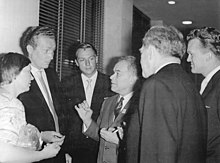Günter Marczinkowsky

Günter Marczinkowsky , actually Günter Otto Wilhelm Marczinkowsky (born September 10, 1927 in Berlin-Pankow , † December 28, 2004 in Hamburg ) was a German cameraman .
Life
In 1942 he began an apprenticeship as a film maker in the Geyer works . In 1944 he was drafted as a soldier in the mountain troops. As a mine clearer in Italy, he was taken prisoner by the Americans, from which he was released in mid-1945.
He then worked as a photo lab technician and projectionist in Berlin. In 1947 he became assistant to the cameraman Robert Baberske . He worked with him on many early DEFA films. Marczinkowsky first acted as chief cameraman for the children's film Adventure in Bamsdorf .
In the following years he was behind the camera in the classics of the director Frank Beyer Five Cartridge Cases , King's Children , Naked Among Wolves as well as Carbide and Sorrel . After the ban on Spur der Steine , he mainly worked for GDR television. In 1980 he settled in the Federal Republic. Apart from a film about Dieter Hallervorden , Marczinkowsky, who was married several times, was then only involved in a few television series.
Awards
- 1961: Heinrich Greif Prize 1st class for five cartridge cases in a collective
- 1963: National Prize of the GDR 1st class for naked among wolves in a collective
- 1975: National Prize of the GDR 2nd class for Jakob the Liar in the collective
- 1978: Art Prize of the FDGB for How should a woman decide? in the collective
Filmography
- 1957: Adventure in Bamsdorf
- 1957: rivals at the wheel
- 1958: Captains stay on board
- 1959: an old love
- 1959: The Boomerang (short film)
- 1959: Lorenz marriage case
- 1959: Jupp versus Bundeswehr (short film)
- 1960: Five cartridge cases
- 1961: Vacation without you
- 1961: The film magazine No. 1. The scarecrow (episode film)
- 1962: royal children
- 1962: Die Holzhacker (short film)
- 1962: TV epitaval: Shot while trying to escape (TV series)
- 1962: man is man (short film)
- 1962: From melody to melody (TV)
- 1962: On time like the bricklayers (short film)
- 1963: Incredible (short film)
- 1963: Bonner Pitaval: The Heyde-Sawade Affair (TV series)
- 1963: Naked among wolves
- 1963: Battle for Germany (documentary film)
- 1963: carbide and sorrel
- 1963: Music urgently wanted (TV)
- 1964: Game for three (TV short film)
- 1966: Trail of the stones
- 1966: The Little Prince (TV)
- 1966: Romeo and Juliet (TV short film)
- 1967: Burning Ruhr (two-part TV series)
- 1968: Farewell
- 1969: The nightingale and the emperor
- 1970: Effi Briest (TV movie)
- 1970: Don Juan (TV)
- 1970: Rottenknechte (TV five-part)
- 1971: The Chanson Journey (TV)
- 1973: The Seven Affairs of Doña Juanita (four-part television film)
- 1974: The Secret of Oedipus (TV)
- 1974: Jacob the Liar
- 1975: The Black Mill (TV)
- 1977: Farewell to Peace (TV three-part)
- 1977: Mission: Survival (TV)
- 1978: How should a woman decide? (TV)
- 1979: Engagement in Hollerbusch (TV)
- 1981: The King and His Fool (TV)
- 1981: The Second Skin (TV)
- 1982: The Barricade (TV)
- 1982: Little Brother (TV)
- 1983: Secret transmitter 1212 (TV)
- 1983–85: It doesn't always have to be murder (TV series)
- 1983/84: The Lehmanns (TV series)
- 1984: The beautiful Wilhelmine (TV four-part series)
- 1985: Didi and the revenge of the disinherited
- 1985: lost property (TV)
- 1985: Johannes Heesters ... I made some delicate bonds (TV)
- 1985/86: Finkenwerder stories (TV series)
- 1987: Evelyn and the Men (TV)
- 1988: In good hands (TV)
- 1988/89: Berliner Weisse with a shot (TV series)
Web links
- Günter Marczinkowsky in the Internet Movie Database (English)
- Günter Marczinkowsky at filmportal.de
| personal data | |
|---|---|
| SURNAME | Marczinkowsky, Günter |
| ALTERNATIVE NAMES | Marczinkowsky, Günter Otto Wilhelm (birth name) |
| BRIEF DESCRIPTION | German cameraman |
| DATE OF BIRTH | September 10, 1927 |
| PLACE OF BIRTH | Berlin-Pankow |
| DATE OF DEATH | December 28, 2004 |
| Place of death | Hamburg |